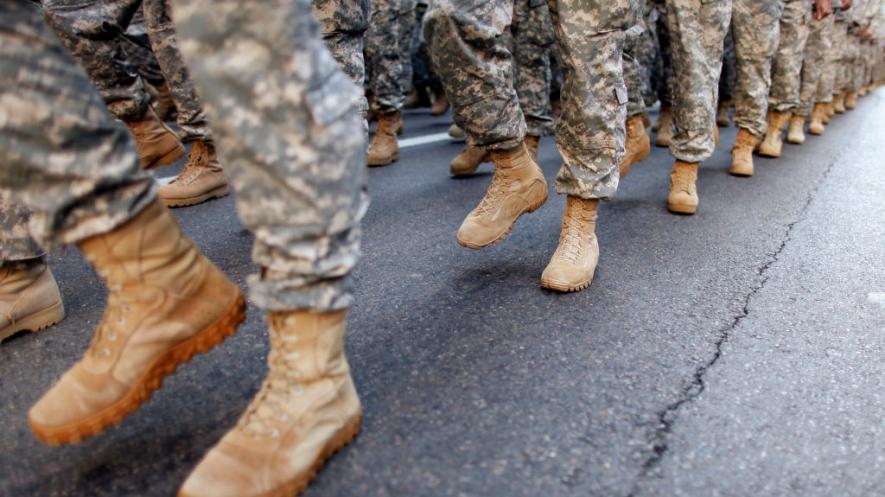US Deploys 1,000 More Troops to West Asia Amid Rising Tension With Iran

Representational image. | Image Courtesy: pbs.org
Washington: Amidst an escalation of tensions with Iran, the US has approved the deployment of 1,000 additional troops in the West Asia for "defensive purposes" to address air, naval and ground-based threats.
The announcement by Acting US Defence Secretary Patrick Shanahan came hours after Iran said it would surpass the uranium-stockpile limit set by its nuclear deal in the next 10 days against the backdrop of soaring tensions between Tehran and Washington.
The action of deploying 1,000 more troops is being taken to ensure the safety and welfare of US military personnel working throughout the region and to protect its national interests, Shanahan said on Monday.
Meanwhile, China on Tuesday warned against opening a "Pandora's box" in the West Asia after the US announced the deployment of 1,000 additional troops to the region amid escalating tensions with Iran.
In Beijing, Foreign Minister Wang Yi also urged Tehran to not abandon the nuclear agreement "so easily" after Iran said it would exceed its uranium stockpile limit if world powers fail to fulfil their commitments under the agreement in 10 days.
However, the US said it does not seek conflict with Iran.
"I have authorised approximately 1,000 additional troops for defensive purposes to address air, naval and ground-based threats in the West Asia," Shanahan said.
"The recent Iranian attacks validate the reliable, credible intelligence we have received on hostile behaviour by Iranian forces and their proxy groups that threaten United States personnel and interests across the region," he said.
The US will continue to monitor the situation "diligently and make adjustments" to force levels as necessary given intelligence reporting and credible threats, Shanahan said.
Last month, National Security Adviser John Bolton said that the US was deploying the USS Abraham Lincoln Carrier Strike Group and a bomber task force to the West Asia in response to a "number of troubling and escalatory indications and warnings" from Iran.
America has blamed Iran for last week's attacks on two oil tankers in the Gulf of Oman, an accusation Tehran has denied as "baseless."
Following the Shanahan's announcement, House Speaker Nancy Pelosi demanded an immediate briefing from the Trump administration.
"Congress must be immediately briefed on the administration's decisions and plans.
"This deeply concerning decision may escalate the situation with Iran and risk serious miscalculations on either side. Diplomacy is needed to defuse tensions, therefore America must continue to consult with our allies so that we do not make the region less safe," Pelosi said.
Senator Dianne Feinstein urged all parties to work towards a diplomatic solution to avoid further escalation.
"The Trump administration inflamed tensions by withdrawing the United States from the agreement and reimposing sanctions on Iran. Iran now says it will violate the agreement unless our European partners can make up for the economic loss caused by US sanctions," the Democratic Senator said.
Don’t Abandon N-Deal ‘So Easily’: China Tells Iran
In Beijing, China’s Foreign Minister Wang Yi said: "We call on all parties to remain rational and restrained, not to take any actions to provoke the escalation of tension in the region, and not to open a Pandora's box. " He was addressing reporters in Beijing during a joint press conference with visiting Syrian Foreign Minister Walid Muallem.
"In particular, the United States should change its practice of extreme pressure," Wang said.
Tensions between Tehran and Washington have escalated ever since the US quit the nuclear deal and with Washington blacklisting Iran's elite Revolutionary Guards as a terrorist organisation.
Wang urged Iran to "make prudent decisions" and not "so easily abandon" the deal that aims to keep Teheran's nuclear ambitions in check.
Iranian President Hassan Rouhani announced on May 8 that Iran would stop observing restrictions on its stocks of enriched uranium and heavy water agreed under the deal, a move he said was in retaliation for the unilateral US withdrawal.
Iran has threatened to go even further in scaling down nuclear commitments by July 8 unless remaining partners to the deal -- Britain, China, France, Germany and Russia -- help it circumvent US sanctions and especially enable it to sell its oil.
"China's determination to safeguard the comprehensive agreement has not changed," Wang said.
"We are willing to work with all parties to continue to make efforts for the full and effective implementation of the agreement."
Get the latest reports & analysis with people's perspective on Protests, movements & deep analytical videos, discussions of the current affairs in your Telegram app. Subscribe to NewsClick's Telegram channel & get Real-Time updates on stories, as they get published on our website.














